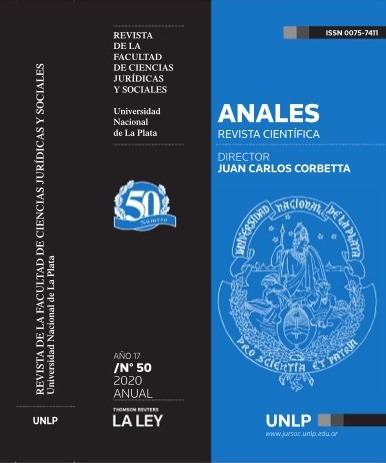The civil judge from the prism of the Argentine Civil and Commercial Code
DOI:
https://doi.org/10.24215/25916386e057Keywords:
judiciary, judge role, legislative change, political ideasAbstract
In 2015, the Argentine Civil and Commercial Code came into force. One of the challenges for judges is to assume the consecration of human rights as an explicit source of Civil and Commercial Law, and as a criterion for interpretation. This legal context illuminates a line of socio-legal investigation whose purpose is to investigate the state and the role of the judge to whom the new Code gives rise, as well as to know what is the margin of autonomy that he has to decide the trials, and what ideological values and principles and legal are the basis of their pronouncements. Taking into account the instrumental, political and symbolic judicial functions, and the civil and commercial code, the figure of the judge and the delicate and necessary role they play will be considered.
Downloads
References
Barbará, J. E. (2008). Estado de Derecho y Autonomía de la Voluntad. Córdoba: Advocatus.
Borda, G. (2008). Tratado de Derecho Civil: Parte General. Buenos Aires: La Ley.
Braybrooke, E. K. (1961). The Sociological Jurisprudence of Roscoe Pound. University of Western Australia Law Review, 288. Recuperado de http://www5.austlii.edu.au/au/journals/UWALawRw/1961/5.html [Fecha de consulta: 01/09/2020].
Calamandrei, P. (2011). Elogio de los Jueces escrito por un Abogado. Buenos Aires: Librería el Foro.
Carretero Sánchez, S. (2015). Nueva introducción a la teoría del derecho. España: Dykinson.
Cuellar Vázquez, A. (2008). Los jueces de la Tradición: un estudio de caso. México: Universidad Autónoma de México.
De Souza Santos, B. (2009). Sociología jurídica crítica. Madrid: Trotta.
Deflem, M. (2006). Jurisprudencia sociológica y sociología del derecho. Opinión Jurídica 5(10) (pp. 107-119). Recuperado de https://deflem.blogspot.com/2006/06/jurisprudencia-sociologica-y-sociologia.html [Fecha de consulta: 01/09/2020].
Ferrari, V. (2006). Derecho y Sociedad: elementos de sociología del derecho. Bogotá: Universidad de Externado.
Gerlero, M. S. (2006). Introducción a la Sociología Jurídica: actores, sistemas y gestión judicial. Buenos Aires: David Grinberg Libros Jurídicos.
Guarnieri, C. y Pederzoli, P. (1999). Los Jueces y la política. Poder Judicial y Democracia. Madrid: Taurus.
Ibáñez, P. A. (2015). Tercero en Discordia: jurisdicción y juez del estado constitucional. Madrid: Trotta.
Lautmann, R. (1991). Sociología y Jurisprudencia. México: Fontamara.
Levy-Bruhl, H. (1964). Sociología del Derecho. Buenos Aires: Eudeba.
Masciotra, M. (2016). Función social del Juez en el Código Civil y Comercial. Recuperado de http://www.saij.gob.ar/mario-masciotra-funcion-social-juez-codigo-civil-comercial-nacion-dacf160382-2016-05-26/123456789-0abc-defg2830-61fcanirtcod?&o=117&f=Total%7CFecha%7CEstado%20de%20Vigencia%5B5%2C1%5D%7CTema/Derecho%20procesal%7COrganismo%5B5%2C1%5D [Fecha de consulta: 27/03/2020].
Minetti Kern, L. (2016). El nuevo rol de los jueces a partir del Código Civil y Comercial de la Nación. Nuevos paradigmas y desafíos. Apertura hacia un sistema de soluciones justas. Suplemento de Doctrina Judicial Procesal, La Ley. Argentina.
Montesquieu (2007). Del espíritu de las leyes. Buenos Aires: Losada.
Pásara, L. (2019). De Montesinos a los Cuellos Blancos: la persistente crisis de la justicia peruana. Perú: Planeta.
Peyrano, J. W. (2006). El perfil deseable del juez civil del Siglo XXI. Revista La Ley (0003/008523).
Riba, M. A. (2018). El pensar de los jueces: elementos de razonamiento judicial. Córdoba: Advocatus.
Downloads
Published
How to Cite
Issue
Section
License
Esta licencia no permite la generación de obras derivadas ni hacer un uso comercial de la obra original, es decir, sólo son posibles los usos y finalidades que no tengan carácter comercial.






























